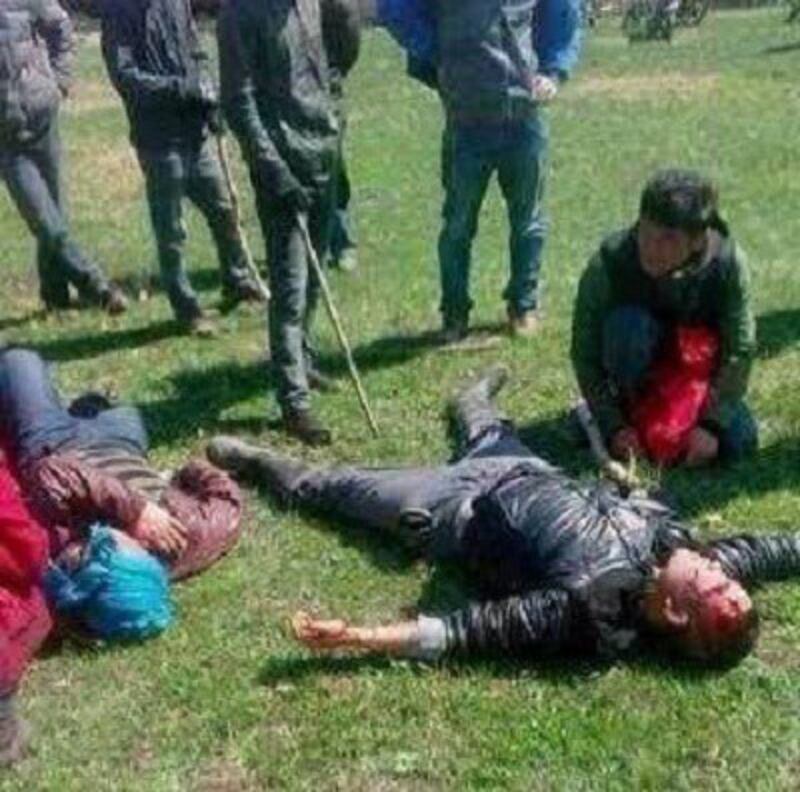Chinese authorities in Inner Mongolia are investigating fresh clashes between ethnic minority Mongolian herders and Han Chinese settlers over land, as Beijing continues to expand farming and mining in the area, an official source said on Monday.
A dozen Mongolian herders in were "severely beaten" while defending their grazing lands after "more than a hundred" Han Chinese gathered to attack them with sticks and stones, the U.S.-based Southern Mongolian Human Rights Information Center (SMHRIC) said in an e-mailed statement on Monday.
The attacks took place on Friday in a village near Bayanhua township, in Right Uzumchin banner (in Chinese, Dong Wuzhumuqin Qi) in northeastern Inner Mongolia's Xilingol league, where in 2011 a herder named Murgen was killed amid standoff with Han Chinese mining company employees in an incident that set off a wave protests by ethnic Mongolians in the region. A banner is a regional division equivalent to a county, while a league is equivalent to a prefecture.
SMHRIC said photos of Friday's clashes showed herders from the Saruulbulag Gachaa group of villages were taken away by ambulance and police vehicles after they fell unconscious from the beatings.

The herders said in a written statement sent to SMHRIC, "[The Chinese] brought in more than a hundred individuals to attack us, injuring a dozen of our herders."
"Not only that, they also damaged our herders’ motorcycles and cars."
"This land belongs to our Mongolian herders of Saruulbulag Gachaa," the statement said.
Local authorities confirmed an incident had taken place.
"We are holding a meeting about this right now," an officer who answered the phone at the Bayanhua township police station.
"We are in the process of investigating this matter, and we are waiting from orders from higher up," the officer said.
Asked if the police had made any arrests, he hung up without replying.
News of unrest blocked
China's online censors, apparently fearing a resurgence of the mass demonstrations seen in 2011 after Murgen was killed while herders protested against the use of their grazing lands, moved swiftly to block all information about the clashes, SMHRIC said.
According to a brief statement posted on the popular social media sites Sina Weibo, QQ, and Baidu by the ruling Communist Party's propaganda branch in Right Uzumchin banner, the authorities are currently "working either to reach an agreement with the herders or to handle the case in accordance with the law."
"The herders’ anger has been appeased now," the statement said. "The case will be resolved shortly."
"Please trust the government’s ability to administer and enforce the law. Just like a small family quarrel between brothers, this will no doubt be resolved with a happy handshake."
Tensions have escalated in recent years between Mongolian herders and Chinese miners and farmers, as the authorities continue to appropriate land to expand mining and other development projects, SMHRIC said.
Hard to recover leased land
A resident of Saruulbulag told RFA's Mandarin Service that problems of recovering land leased to Han Chinese farmers are common in the banner.
In 1994, they leased five households' worth of grazing land as part of a poverty alleviation scheme, 10,000 mu [670 hectares, or 1,600 acres] of which was my family's," he said.
"By 1997, there was a different village Party secretary and a different head of the village ... and they had used their connections at the grasslands supervision bureau and with local herders to issue title deeds to the land ... and they were all fake," he said.
"Because they had this headed paper from the grasslands supervision bureau, the court refused to pay out [on our compensation claim]," the herder said.
Herders’ protests have become commonplace in Inner Mongolian rural communities as they increasingly attempt to defend their shrinking grazing lands against Chinese encroachments, it said.
Last month, more than 100 Chinese farmers assaulted minority Mongolian herders during a dispute over leased land, leaving seven herders seriously injured in Bayantal township in Ongniud (in Chinese, Wengniute Qi) banner.
The April 27 violence came after Chinese farmers refused to hand back land leased to them for 10 years in 2013.
Ethnic Mongolians, who make up almost 20 percent of Inner Mongolia's population of 23 million, complain of destruction and unfair development policies in the region. The overwhelming majority of residents in the region are Han Chinese.
Reported by Qiao Long for RFA's Mandarin Service. Translated and written in English by Luisetta Mudie.

